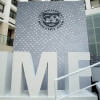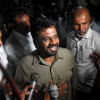Sri Lanka inflation continues falling

Sri Lanka's consumer price inflation rate eased to 0.8 percent year-on-year in September from 2.1 percent in August, the statistics department said on Monday.
The National Consumer Price Index captures broader retail price inflation and is released with a lag of 21 days every month.
Food prices fell 5.2 percent in September after declining 5.4 percent in August, from a year earlier, the Department of Census and Statistics said in a statement.
Prices for non-food items, however, climbed 5.9 percent in September after rising 9 percent year-on-year in August.
Sri Lanka experienced record high inflation after its economy was pummelled by the worst financial crisis in decades.
But since June, its inflation has come down sharply, partly due to the statistical base effect, but also helped by a stronger rupee currency, and improved harvests.
Sri Lanka raised power prices for households by 18 percent last week but the increase is unlikely to significantly push up inflation, analysts said.
"We expect inflation to end the year at about 5 percent. A small increase is expected as the base effect is coming to an end from September but the impact from price adjustments is not expected to be severe," said Dimantha Mathew, head of research at First Capital Research.
Sri Lanka secured a staff level agreement on the first review of its $2.9-billion bailout from the International Monetary Fund (IMF) last Friday but it still needs approval from the global lender's Executive Board.
The island needs to finalise debt restructuring talks with main bilateral lenders including Japan and India as well as bondholders to get past the first review and secure a second tranche of about $330 million.
The battered economy is still expected to contract by 2 percent in 2023 after shrinking 7.8 percent last year.

 For all latest news, follow The Daily Star's Google News channel.
For all latest news, follow The Daily Star's Google News channel. 







Comments